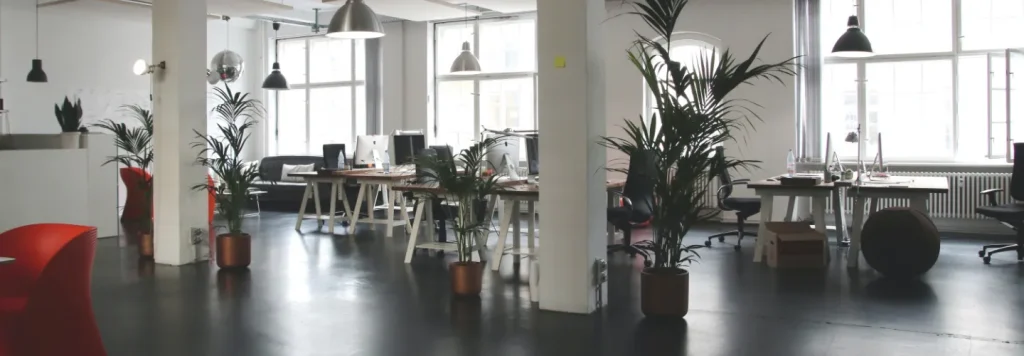Before you take the leap of renting or leasing office space, be sure you consider what this means for your business.
Getting a dedicated office space is an important step in small business growth. Whether you’re expanding your current location or moving elsewhere, it’s important to understand the agreements that come with a business lease or rental agreement.
Given how much of your business’s future rides on a lease, it’s important to read the fine print and know exactly what you’re signing. Understanding these key areas will help protect your business interests for the long haul. With the help of Travelers Insurance, here are five things to consider before you sign.
1. What Does the Commercial Lease Include?
The rental rate is always a top consideration in choosing a property, but it’s also important to know what that rate includes. Commercial leases come in a variety of formats, depending on how the building’s operating expenses are passed on to the tenant. The three most common types of leases include:
- Full-service or gross lease. As the tenant, you would pay a fixed amount each month. The landlord would pay all building-related expenses.
- Net lease. The tenant agrees to pay base rent plus expenses, which may include the cost of utilities for the leased space and a proportional share of property taxes, insurance, and utilities and maintenance fees for common areas.
- Modified gross lease. This is a hybrid of a gross and net lease. As the tenant, you would have a gross lease, but would be responsible for certain increases in the operating expenses over the lease term.
Before signing a lease, be sure you understand the proposed lease structure and what you’d be responsible for paying as a tenant. If you would be expected to pay expenses, ask the landlord for projections of their costs to help you plan. You may be able to negotiate terms that will work better for your business, including caps to keep expenses within a reasonable range.
2. What Are the Lease and Renewal Terms?
A commercial lease typically runs for a term of five, seven, or ten years, and sometimes longer. This helps guarantee occupancy for the landlord and may mean lower rental rates over a longer period of time for prospective tenants.
A short-term lease of a year or two may allow your business greater flexibility. But you’ll want to be prepared for new terms when the lease expires. Discuss the option to renew up front and have any renewal terms clearly articulated in the lease document, including the length of the term and how the landlord will calculate the renewal rate.
3. How Does the Lease Handle Improvements?
You might want to make changes or improvements to customize the rental space to work for your business. Negotiating these “build-out” requirements — such as custom cabinets, carpeting, cubicles for employees, or tearing down or building walls — is an important part of establishing a lease agreement. You’ll want the details spelled out, including the specific changes that will be made, their cost, who will pay for them, who will own them upon completion, and whether the property must be returned to its original state after your lease is up.
4. What Happens if You Need to Break the Lease?
Breaking a lease can be expensive. You could be responsible for rent payments for the remainder of the term of your lease, as well as other penalties that can vary based on where you live and your state’s real estate laws. To minimize your liability, ask to include a break clause in your lease that defines terms for getting out of the lease, if needed, and the specific amount of any penalties you’ll need to pay. Also, negotiate your right to transfer or “assign” your lease to a new owner or sublet all or a portion of your space.
5. What Kind of Commercial Lease Insurance Do You Need?
Make sure your lease clearly states your insurance obligation – that is, the coverage required and who will pay for it – so there aren’t any surprises in case of a lawsuit or loss. Every lease is different, but in most cases, the landlord purchases insurance for the building and common areas while the tenant’s commercial property insurance covers your actual rental space and its contents. It includes your business’s personal property, such as furniture, equipment, and inventory, and it may include improvements and betterments made to the premises.
Knowing the true value of your property is important. You’ll want to choose coverage limits that are enough to cover what it would cost to replace your property if it gets damaged or stolen. Otherwise, you might need to pay out of pocket for anything that exceeds the limits of your policy.
Don’t forget – as the tenant, liability insurance can provide protection against potential lawsuits arising out of the use of the premises, such as if an employee or visitor slips and falls on the premises.
Navigating a rental agreement and/or commercial lease insurance can be challenging. A real estate broker can provide invaluable assistance, but you could also benefit from the unbiased perspective of a legal professional. Also, ask your insurance agent to review the insurance provisions within the lease to make sure there are no coverage gaps and that you meet your insurance requirements with the protection your business needs. If you’re in the greater Rochester, NY area, reach out to The Feltner Group to set up a consultation to discuss your small business or commercial lease insurance coverage today!
